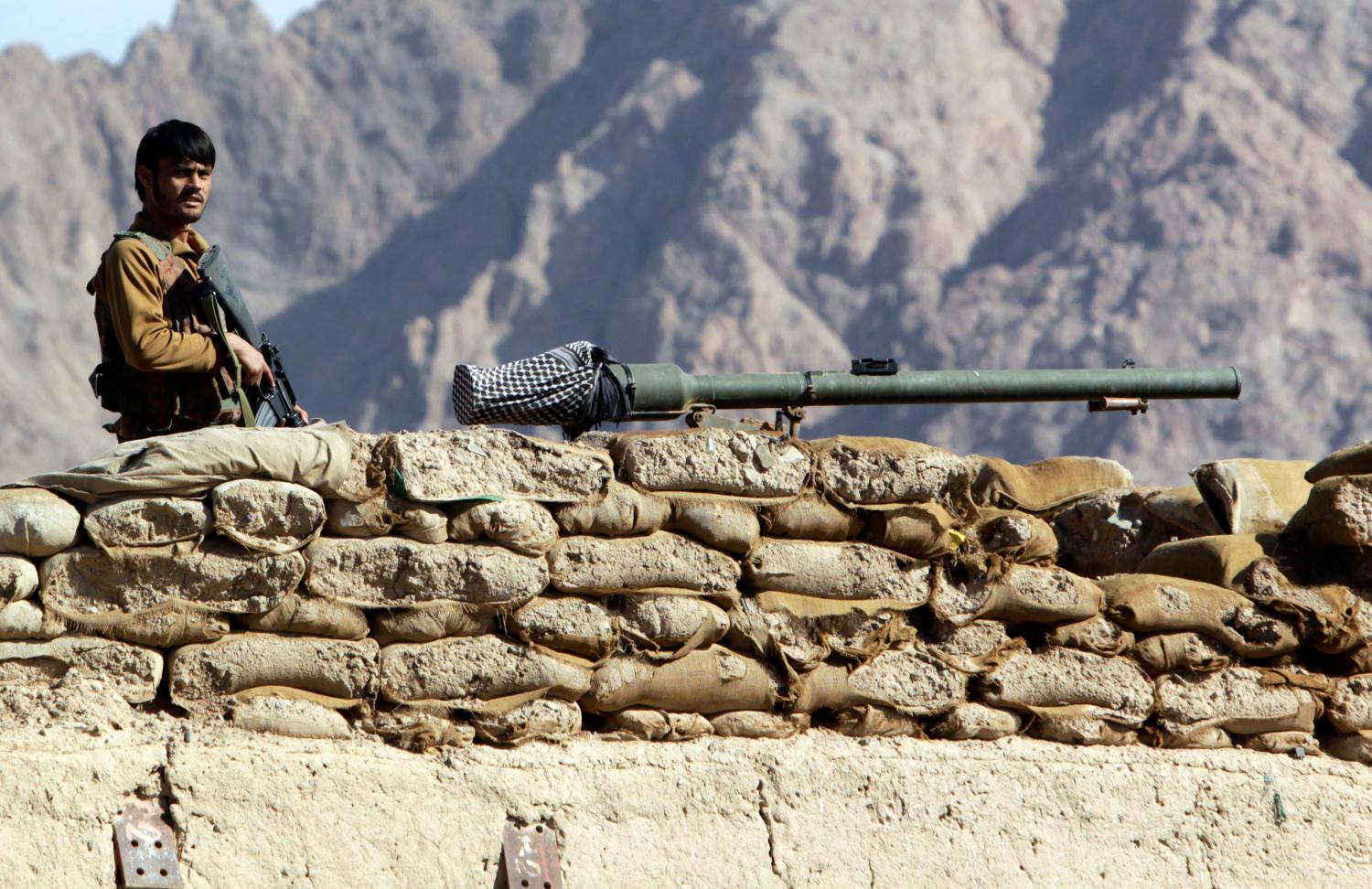A security meltdown in Afghanistan would severely compromise America’s ability to pursue its interests in the region, leaving the United States with few policy options. Vanda Felbab-Brown drafted this memorandum to President Obama as part of
Big Bets and Black Swans: A Presidential Briefing Book
.
- What actions will the U.S. have to take to ensure stability in a post-2014 Afghanistan?
- What can the U.S. do to end corruption and strengthen accountability and rule of law in Afghanistan?
Download Memorandum
(pdf) |
Download the Presidential Briefing Book
(pdf)
TO: President Obama
FROM: Vanda Felbab-Brown
As the 2014 transition to a radically diminished U.S. presence and mission in Afghanistan approaches, it is likely to leave in its wake a perilous security situation, a political system few Afghans see as legitimate, and a likely severe economic downturn. Although a serious security deterioration, including the possibility of a civil war that many Afghans fear, is far from inevitable, it is a real possibility. Such a security meltdown would severely compromise American ability to prosecute U.S. interests in the region, leaving the United States with few policy options.
Recommendations:
Even though U.S. leverage in Afghanistan diminishes daily, U.S. decisions still critically affect Afghanistan’s future. The United States can still take important steps to minimize the chances of a critical security meltdown in Afghanistan after 2014:
• Withdrawing in an orderly fashion at a judicious pace that does not step ahead of Afghanistan’s security capacities;
• Continuing to provide security assistance, such as training, combat support, and specialty enablers after 2014, and restraining the splintering of the Afghan National Army;
• Defining negotiations with the Taliban as a broader societal reconciliation process that entangles equally the Taliban and the Afghan government in rule-of-law constraints and pluralistic processes, rather than as close-to-the-vest powerbroker bargaining and a fig leaf for U.S. departure;
• Elevating the emphasis on good governance on par with security, supporting political reformers, and not consistently compromising good governance for the sake of short-term military exigencies — without greater legitimacy for the Afghan government, there is little chance for stability in Afghanistan;
• Avoiding a premature embrace of abusive Afghan powerbrokers, many of whom are currently favored by the United States — the United States may have to rely on them eventually to help protect U.S. interests including counterterrorism operations, but that does not mean that it should embrace them today.
Background:
In the military surge areas of Helmand and Kandahar, there have been palpable security gains. How robust they are remains to be seen. In the east, where the Haqqanis operate close to Pakistani safe-havens, the war is stalemated. Parts of the north, such as Balkh, are very stable, but bitter ethnic tensions are brewing in Kunduz and Baghlan and elsewhere in Afghanistan. The Afghan National Security Forces (ANSF) have improved, but cannot yet function without international enablers. Patronage networks pervade the ANSF, and a crucial question is whether the forces will splinter along ethnic and patronage lines post-2014.
Since 2009, U.S. aid has flooded into Helmand and Kandahar but instead of bringing sustainable development, it distorted local economies and triggered contestation over the spoils. Turning off this spigot is no loss. But U.S. departure will produce a massive economic constriction in Afghanistan.
Corruption, serious crime, land theft and other usurpation of resources, nepotism, a lack of rule of law, and exclusionary patronage networks permeate Afghanistan’s current political dispensation. Afghans crave accountability and justice and resent the current mafia-like rule. Improved human security plus leadership accountability are their unfulfilled aspirations. Whether the 2014 elections will usher in better governance or trigger violent conflict is another huge question mark.
U.S. Interests after 2014:
The United States will continue to have important interests in Afghanistan’s stability, including countering terrorism. The Taliban may have soured on al Qaeda, but a full break with al Qaeda generates costs — with respect to maintaining internal unity and provoking attacks by the now-betrayed salafi brethren. Whether the Haqqanis would obey the Taliban or pick al Qaeda is also a question mark. Should the Taliban, through fighting or a negotiated deal, come to control parts of Afghanistan, at best the Taliban will attempt to appease both the salafists and the United States.
Prosecuting U.S. counterterrorism interests from the air depends on local bases and human intelligence. Many powerbrokers and informants cultivated by the United States will have an incentive to hedge and minimize intelligence flows to those serving their, not necessarily U.S., interests.
Should a Pakistani nuclear weapon or some fissile material be acquired by a terrorist group, a usable Afghan military base would be highly advantageous for the U.S. ability to recover them.
An unstable Afghanistan will be like an ulcer bleeding into Pakistan. It will further distract Pakistan’s leaders from tackling the country’s internal security, economic, energy, and social crises, and the radicalization of Pakistani society. These trends adversely affect U.S. interests.
An unstable Afghanistan will also worsen overall security in the broader region, destabilizing Central Asia as well. Iran, Russia, India, Pakistan, the Central Asian countries, and perhaps even China will be at least indirectly drawn into the Afghanistan conflict and cultivate proxies.
Scenarios of a Security Meltdown and U.S. Policy Options:
A major security collapse in Afghanistan will in the initial phases likely resemble the early 1990s pattern of localized and fragmented ethnic and local-powerbroker infighting with pockets of stability, rather than the late 1990s when a Taliban-advancing line of control moved steadily north. The extent of violence and fragmentation will depend on whether the ANSF, particularly the Afghan Army, splinters. Even then, a rump ANSF and the Afghan government may have enough strength to hold Kabul, major cities, and other parts of Afghanistan. The Taliban will control parts of the south and east. Elsewhere infighting may be among members of a resurrected Northern Alliance or among Durrani Pashtun powerbrokers. But ethnic fighting may eventually explode even on the streets of Kabul where Pashtuns harbor resentments about the post-2001 influx of Tajiks that changed land distribution in the capital.
Options available to protect U.S. interests will depend on whether a U.S.- Afghan Status-of-Forces agreement (SOFA) has been signed and the United States has military forces and bases in Afghanistan. In the absence of a SOFA and bases, the United States will be dependent on indirectly supporting selected warlords.
If the United States retains bases and forces in Afghanistan, you will face the following choices:
• Should the United States fly sorties and for what purposes? Against al-Qaeda only or more broadly against the Taliban? Should the United States extend assistance to the Afghan government? Any attacks on U.S. bases will generate pressures for either U.S. ground operations or a full troop withdrawal from Afghanistan.
• Should the United States support certain battlefield objectives — for example, avoiding the fall of Kabul or supporting a de-facto partition of Afghanistan north of Kabul? Through what military means — the use of air power only or special operations forces assistance, or other ground-combat support as well?
• Assuming the most important U.S. interest in the region is that Pakistan’s nuclear capabilities are not acquired by a salafi group, and that having a land reach into Pakistan is important, could Afghan authorities ever consent to the United States having access to Afghan bases only for strikes into Pakistan? Pakistan would of course do all it could to subvert any such arrangement.
Regardless of whether the United States retains bases and directly engages in Afghanistan’s conflict or not, it will also face the following policy questions:
• How should the United States react to any effort by Northern Alliance members to provide safe havens to Baluchi insurgents to retaliate for Pakistan’s support for the Taliban? Pakistan will be determined to ensure that the northerners cannot complicate Pakistan’s security interests and Taliban control in southern Afghanistan. If Pakistan intensifies its support for the Taliban and the United States seeks to limit the Taliban’s control, U.S.-Pakistan military encounters could increase.
• Should the United States acquiesce in or encourage greater Indian security involvement in Afghanistan to minimize Taliban and salafi presence? Pakistan will see such Indian presence as extremely threatening, a development complicating U.S.-Pakistan relations.
Conclusion:
A direct U.S. military engagement, even if limited to air strikes or special forces operations, will entangle the United States in prolonged conflict that, at best, may disrupt al Qaeda presence or Taliban control. Maintaining domestic support for such a U.S. role will be difficult. None of the direct limited or indirect engagement policy alternatives will easily result in stable territorial boundaries and an end to the conflict. U.S. ability to secure its interests would be decidedly poor. Doing all your administration can before 2014 to strengthen Afghanistan’s security and the legitimacy of the Afghan government to avert a major meltdown is by far the best policy.
The Brookings Institution is committed to quality, independence, and impact.
We are supported by a diverse array of funders. In line with our values and policies, each Brookings publication represents the sole views of its author(s).




